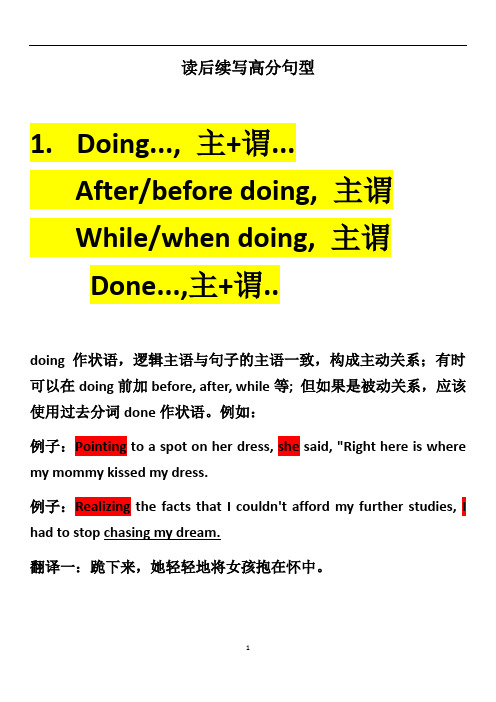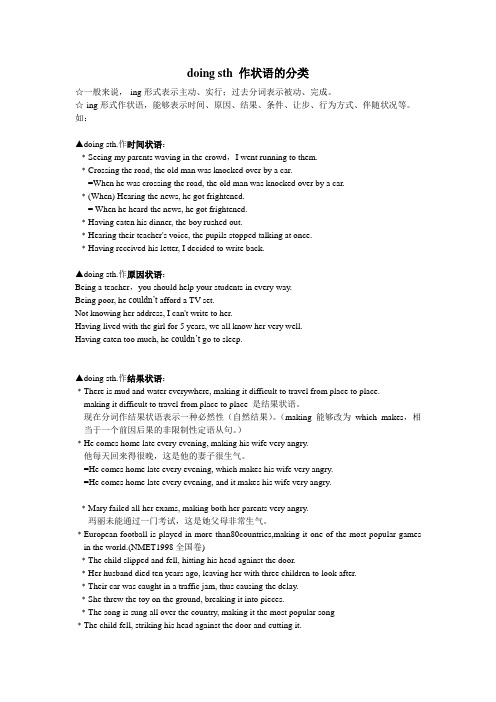doing作状语
- 格式:docx
- 大小:24.09 KB
- 文档页数:7

读后续写高分句型1.Doing..., 主+谓...After/before doing, 主谓While/when doing, 主谓Done...,主+谓..doing作状语,逻辑主语与句子的主语一致,构成主动关系;有时可以在doing前加before, after, while等; 但如果是被动关系,应该使用过去分词done作状语。
例如:例子:Pointing to a spot on her dress, she said, "Right here is where my mommy kissed my dress.例子:Realizing the facts that I couldn't afford my further studies, I had to stop chasing my dream.翻译一:跪下来,她轻轻地将女孩抱在怀中。
例子:When feeling hungry, I just drank water to fill my stomach.翻译二:当5) After knowing I had a good command of English, he offered me a typing job, promised to teach me computer and provided accommodation.6)Slowly turning the pages, I suddenly saw a picture of my beautiful daughter Beth, which instantly grabbed my heart and transported me back in time.Kneeling down, she gently held the girl in her arms.2. 主+谓..., doing...doing作伴随状语,与句子的谓语动词同时发生,逻辑主语与句子的主语一致,构成主动关系;该句型可以以并列谓语的形式出现,转化为:主+谓...and 谓...; 但如果是被动关系,应该使用过去分词done作伴随状语。


Doing非doing,用法不一样Doing是非谓语动词中的一种,但是在英语中由于用法不同有两个说法,一个是动名词,另一个是现在分词,该语法即是学习难点,又是高考重要考点,而学生还容易混淆,为此笔者做了一些总结,希望有助于“doing”一词用法的学习一、动名词动名词的形式及特性:动名词的形式是由动词原形+ing 构成,动名词有时态和语态的变化,兼有动词和名词的特征,因而在句中可以作主语、表语、定语、动词的宾语、介词的宾语等。
1.doing的一般式是doing,表示动作与谓语动词同时发生或在其后发生,或表示一般情况。
Eg. Learning is important to modern lifeIt’s a wonder meeting you hereI am thinking of getting a new dictionary2. doing的完成式为having done,动名词的完成式所表示的动作在谓语动词动作之前发生,he didn’t mention having failed the exam.He denied having done anything illegal.但是要注意有些明确表示时间的动词和介词after/on/upon/for之后,常用一般式代替完成式,表示动作发生在谓语动作之前。
After having (had)some practice,he decided to try again.After hearing(=having heard)that good news,she couldn’t help laughing3. doing 的被动语态为being done:当动名词的逻辑主语是行为的承受者时,用被动语态eg. This question is far from being settledshe is proud of being admitted into the university.Being lost in the forest is a terrible thing4. 特殊情况必须用动名词:1)动名词做宾语:有些动词或短语动词后常用动名词作宾语。


v-ing形式作状语v-ing形式作状语时,用于修饰某动词或整个句子,所表示的动作与句子主语构成逻辑上的主谓关系。
v—ing形式作状语时,可以单独使用,也可以在其前加上when,while,after,if,unless,although,though 等连词,表示时间、原因、条件、让步、结果、伴随、方式等.1。
作时间状语Hearing this news,she got frightened. 听到这个消息,她感到害怕。
Looking out of the window,I saw some children playing football。
Turning around , he saw a tiger running up.2. 作结果状语The boy ran even faster,reaching the school out of breath. 那个男孩跑得更快了,到达学校时累得上气不接下气了。
The child slipped and fell,hitting his head against the door。
Her husband died, leaving her four children。
They fired, killing many people in the street。
3。
作伴随状语He stood by the window,watching people passing by his window。
He came running.She stood waiting for a bus。
He sat there reading a book。
The students ran out of the classroom, talking and laughing。
4. 作原因状语Being a student,I must study hard. 作为一名学生,我必须努力学习.Seeing nobody at home,he left them a note.Not knowing his telephone number, I couldn't get in touch with him.5。

doing sth 作状语的分类☆一般来说,-ing形式表示主动、实行;过去分词表示被动、完成。
☆-ing形式作状语,能够表示时间、原因、结果、条件、让步、行为方式、伴随状况等。
如:▲doing sth.作时间状语:﹡Seeing my parents waving in the crowd,I went running to them.﹡Crossing the road, the old man was knocked over by a car.=When he was crossing the road, the old man was knocked over by a car.﹡(When) Hearing the news, he got frightened.= When he heard the news, he got frightened.﹡Having eaten his dinner, the boy rushed out.﹡Hearing their teacher's voice, the pupils stopped talking at once.﹡Having received his letter, I decided to write back.▲doing sth.作原因状语:Being a teacher,you should help your students in every way.Being poor, he couldn’t afford a TV set.Not knowing her address, I can't write to her.Having lived with the girl for 5 years, we all know her very well.Having eaten too much, he couldn’t go to sleep.▲doing sth.作结果状语:﹡There is mud and water everywhere, making it difficult to travel from place to place.making it difficult to travel from place to place 是结果状语。
高中英语秋季班(教师版)11 / 6初三英语同步课程秋季班-高中英语-复习课-写作技巧22 / 6初三英语同步课程秋季班-高中英语-复习课-写作技巧v1.0 可编辑可修改33 / 6初三英语同步课程 秋季班-高中英语-复习课-写作技巧一、用动词的适当形式填空:非谓语动词作状语大多相当于一个状语从句A.作时间状语:eg.)①_______ (hear) the bad news, they couldn’t help crying.= _______________, they couldn’t help crying.②When/ While( _____ _____ ) ____ (take) around the city, we were deeply impressed by the city’s new look.While/When (I was) _____ (wander) through the square, I caught sight of a snake-charmer. ③_______ (finish) his work, he went home.=_____________, he went home.B.作原因状语:Eg.) ①_____ (be poor), he could not afford to travel abroad.=____________, he could not afford to travel abroad.________ (encourage) by his heroic deeds, they worked harder._______ (lose) in thought, he almost ran into a post.________ (frighten) by the big forest fire, the animals all ran away._____ (not know) her address, we couldn't get in touch with her.②______ (never be) to the city, he soon got lost._________ (not receive) his letter, I decided to call him up.知识点讲解=_____________.C.方式/伴随状语;Eg.)①She watched the film, _____ (weep ) and ___ (sigh).②The teacher stood there, ______ (surround) by a lot of students.D.作条件状语:Eg.)①______ (give) another chance, I would have done the job far better.=______________ , I would have done the job far better.②(If) _____ (play) all day, you will waste your valuable time.E.作结果状语:(意料中的结果)Eg.)① The hunters fired, _____(shoot) one of the wolves.②The bus was held up by the snowstorm, thus _____ (cause) the delay.区别: 不定式表示意外的结果eg.) He hurried to the station, only ____ (find) the train had left.F.作让步状语:Eg.)①Though ____ (rain) heavily, it cleared up very soon.= _____________, it cleared up very soon.②Though _____ (tell) of the danger, he still risked his life to save the boy.分词作状语时, 需注意事项:A.分词短语作状语时,它的逻辑主语通常应是________ :____ (see) from the hill, the city is beautiful.___ (see) from the hill, you can see the whole city二、使用doing和done简化以下状语从句:44 / 6初三英语同步课程秋季班-高中英语-复习课-写作技巧1.When arriving, send me a telegram. (When you arrive, send me a telegram.) 到达之后,来个电报。
非谓语动词——doing(现在分词,动名词)(1)功能:在句子能做主语、宾语、表语、定语、补语和状语, 但不能单独做谓语.一:作主语Playing basket ball is very interesting .Surfing the internet could help people feel less lonely.His coming gave us great encouragement.Going from junior high school to senior high school is a really big challenge.还可以用it作为形式主语。
It is no good playing games on line.It is no use saying without action.It was great fun walking along the river.It is a waste of time playing the online game.It is worthwhile attending the social activity.二作宾语:He enjoys playing the guitar.(concider,finish,imagine,keep,practise,permit,prevent,risk,admit,avoid,,appreciate,excuse,delay,mind, miss,escape,dislike,abandon,oppose, tolerate/bear/stand)Her sister is good at making friends.(look forward to,be used to,devote to ,get down to,stick to, object to ,give up,go on, insist on, have difficulty/trouble in,be busy with, be fond of ,feel like,be worth)三作定语:The sleeping child is only five monhs old.There are some students reading books in the reading room.He received a letter asking for advice.四作宾语补足语:(V+宾+doing)We saw the sun rising from the east when we stood on the hill.I didn’t notice him sleeping in bed.The teacher kept the student standing out of the classroom all the morning.可以带有这种复合宾语的动词有感官动词see, watch, hear, listen to, notice , observe, feel, find,catch 和使役动词have, keep, get, leave等。
doing作状语1.用法:动词ing作状语时,可以表示时间、原因、结果、条件、方式或伴随动作。
通常可转化成与之相对应的状语从句。
2.分类:(1)作时间状语e.g. Walking in the park, she saw an old friend.= When/While (she was) walking in the park, she saw an old friend.Having finished the work, he went to see his teacher.= After he had finished the work, he went to see his teacher.(2)作原因状语e.g. Being too young, he couldn't join the army.= As he was too young, he couldn't join the army.Not knowing how to get there, I had to ask the way.= As I did not know how to get there, I had to ask the way.(3)作条件状语e.g. Working hard, you'll make great progress.= If you work hard, you'll make great progress.(4)作结果状语e.g. His parents died, leaving him an orphan.= His parents died and left him an orphan.The snow lasted a week, resulting in a serious traffic confusion in the whole area.=The snow lasted a week, and resulted in a serious trafficconfusion in the whole area.注意:动词ing形式与不定式均可作结果状语,区别是:动词ing 形式表示顺其自然、意料之中的结果,而不定式则表示不愿看到的、出人意料的结果。
(5)作方式状语或伴随状语e.g. He came running back to tell me the news.I stood by the door, not daring to say a word.= I stood by the door, and didn't dare to say a word.(6)作让步状语though, although, even if, even though意为“虽然”,不与but连用,但可以与yet(但是)连用,引导让步状语从句;e.g. Studying English only a few years, Tom can speak it very well.=Though Tom studies English only a few years, he can speak it very well.3.动词-ing形式的时态如果动词ing形式表示的动作与主句谓语动词的动作同时发生,用其一般式(doing);如果先于谓语动词的动作发生,用其完成式(having done)。
e.g. Seeing nobody at home, he decided to leave them a note.Having worked for three hours, he took a rest.= After he (had) worked for three hours, he took a rest.4.动词ing形式的语态:①用法:使用现在分词的主动式还是被动式,主要取决于现在分词和句子主语之间的关系。
句子的主语就是分词的逻辑主语。
②结构:doing/ having done/ having been donee.g. Having been shown around the factory, they were very happy. (现在分词的被动式)Having finished his homework, he went to bed.5.动词ing 形式的否定式:①直接在doing前面加not:②结构:not +doing;not having +done;not having been+donee.g. Not knowing this, he didn't come.Not having made full preparations, we put off the sports meeting.6.动词-ing形式作状语需注意的问题:(1)逻辑主语:动词ing作状语,其逻辑主语通常是句子的主语,它们之间是一种逻辑上的主动关系。
e.g. Hearing the bad news, she didn't know what to do. (hearing的逻辑主语是句子的主语she)Finding her dog, Mary is so happy.(2)独立主格动词ing作状语,有时它也可以有自己独立的主语,这种结构称为独立主格结构,通常用来表示伴随的动作或情况,也可以表示时间、原因或条件。
e.g. The rain having stopped, we went on marching.The pen writing well, I often use it.(3)悬垂分词有些现在分词作状语,在句中没有逻辑上的主语而独立存在,用来修饰主句,表明说话者的态度、观点等,被称为评论性状语或悬垂分词。
常见的有generally/strictly/frankly speaking(一般/严格/坦率来说), judging from(据判断), considering(考虑到), supposing(考虑到), providing(考虑到)等。
e.g. Generally speaking, girls are more interested in literature than boys.Judging from his accent, he must be from the south.6语法填空(1) ___________(know) English well, he translated the article without much difficulty.(2) The children rushed out of the classroom, _________(laugh) and talking merrily.(3) ________(live) in China for many years, he can speak Chinese fluently.(4) Not _________(know) his address, I had to search for the information on the computer.(5) He often carefully watched the doctors in the_____________(operate) room.(6) __________(stand) on the top of the mountain, I could see thewhole city.(7) ______________(catch) in the rain, he was wet all over.(8) _________(taste) delicious, this kind of pears was soon sold out.(9) ________(hear) the news, some fans were very excited.(10) _______(turn) to the left, you’ll find the library.(11) _______(have) no choice, they had to wait.(12) The students came in, _________(follow) their teacher.(13) _______(know) my address, he never comes to see me.(14) The song is sung all over the country, _______(make) it the most popular song.(15) ____________(do) the homework, the little boy began to play Internet games.(16) ___________(do) the homework, the boy didn’t notice his mother’s coming in.(17) _________(try) to find a job, he was busy every day.(18) ____________(try) for a long time, he finally found a job in a local company.(19) ____________(work) hard all day, I went to bed early.(20) ___________(work) hard, we will realize our dream.(21)_______________(play) tennis on behalf of China for nearly 15 years, Li Na announced her retirement (退役)on November,19, 2014.(22) ____________________(trap) in the well for a long time, I am eager to see the outside world.(23) ____________ (not know) his address, I can’t write to him.(24) ________________ (not repair) his car, he rode a bike to work.7.答案:(1) Having known; (2) laughing; (3) Having lived; (4) knowing; (5) operating; (6) Standing; (7) Caught; (8) Tasting; (9) Hearing; (10) Turning; (11) Having; (12) following; (13) Knowing; (14) making;(15) Having done; (16) Doing; (17) Trying; (18) Having tried;(19) Having worked; (20) Working; (21) Having played;(22) Having been trapped; (23) Not knowing; (24) Not repairing8.动词-ing形式的变化过则:(1)一般情况下,直接加ing;e.g. go—goingask —askinglook—lookingcarry—carrying(2)以不发音的e结尾的动词,去e加ing;e.g. write—writingmake—makingtake—takingmove—movinglive—livingleave—leaving(3)以重读闭音节(一个元音加一个辅音)结尾的动词,末尾只有一个辅音字母,双写这个辅音字母,再加ing;e.g. get—gettingsit—sittingput—puttingrun—runningbegin—beginningplan—planningcut—cuttingget—gettingbeg—begging(4)注意(特殊):die—dyinglie—lyingtie—tyingpicnic—picnickingpanic—panickinglisten—listeningdevelop—developing。